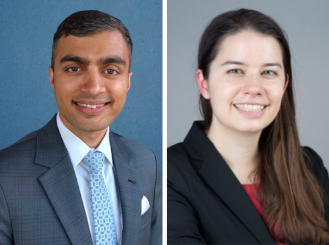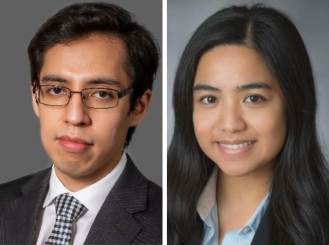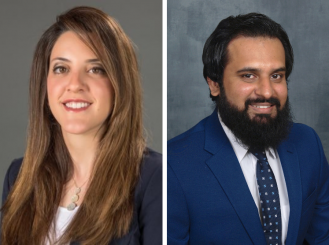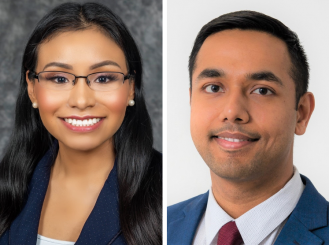By Karun Neupane, MD, Fionnuala Crowley, MD, Franco Castillo Tokumori, MD, Kristine Lacuna, MD, Alma Habib, MD, Muhammad Salman Faisal, MD, Andrea Anampa-Guzmán, MD, and Aakash Desai, MD, MPH
HemOncFellows Network (@HemOncFellows) organized a Twitter Spaces session on August 4, 2023, to address the common questions that hematology-oncology fellowship applicants have after submitting their fellowship application. The article is based on the discussion from the Twitter Spaces session with slight adjustments to enhance readability.
A note on roles and authorship: The session was hosted by Dr. Karun Neupane (KN) and co-hosted by Dr. Muhammad Salman Faisal. The speaker panel included Dr. Fionnuala Crowley (FC), Dr. Franco Castillo Tokumori (FT), Dr. Kristine Lacuna (KL), and Dr. Alma Habib (AH). This article’s composition was undertaken by KN and underwent a collaborative proofreading and editing process involving all the authors. Dr. Andrea Anampa-Guzmán and Dr. Aakash Desai contributed to prepare this article as the members of HemOncFellows Network.
KN: What is the typical timeline for receiving interview invitations after submitting the hematology-oncology fellowship application? When should one expect to start receiving interviews, and until when?
FC: I received my first interview invitation on August 1, and my final interview invitation around August 29. In total, I had about 13 or 14 interviews, all of which came in the month of August. I scheduled most of my interviews during the first 2 weeks of October while I had an elective, and I also managed to fit in some interviews during my days off in the ICU or before/after night shifts in August and September. My last interview took place in the last week of October.
It's worth noting that some programs send out all their interview invites at once, while others do it in waves. So, if you didn't receive an interview invitation when the initial round was sent out, it doesn't mean you won't get one later on.
FT: From what I recall, most interview invitations are typically sent out between the second and fourth weeks of August. So, if some of you haven't received interviews by early August, there's no need to stress out.
KN: During the residency application, applicants generally have to quickly book a date within a few hours of getting the interview invitation before all the spots were filled. Did you face a similar situation during the fellowship application process, or did most programs offer enough interview slots so that you could book your spot a bit later?
FC: I recall one program that only provided a single interview date, but in general, all other programs offered multiple dates to choose from. If I was 100% unable to join any of the available interview dates, the programs generally would work with me to try and figure something out. This was also true for a colleague of mine. The programs usually tried their best to accommodate such requests. Unlike during the residency application, where it could be challenging to secure an interview spot, most fellowship programs make an effort to accommodate everyone they invite for an interview.
KN: During the interview season, what are a few things you believe you did correctly? What are a few things you wish you could have done differently after submitting your fellowship application?
KL: One thing I did correctly was reaching out to programs that genuinely interested me. I took the initiative to contact first-year fellows to learn about their experiences and even connected with some second-year fellows to inquire about their research time. Many programs also organize happy hours or meet-and-greet sessions where you can interact with current fellows. Attending these events gave me a better understanding of the program and allowed me to assess the camaraderie among fellows, which was essential for me when ranking programs. With virtual interviews, putting in some extra effort was necessary to truly understand the programs I was interested in.
FC: I want to preface my response by mentioning that I ended up at my top choice in the combined oncology and palliative care program. However, in the week leading up to Match Day, I was obviously worried I might not match at Sinai or my other top choices and regretted not being more proactive and assertive early on in reaching out to programs that I was genuinely interested in.
I think as an international medical graduate (IMG) needing a visa, I thought that even if I reached out I still wouldn’t be ranked highly over a non-IMG. I learned, during and after the interview process, that this assumption was not entirely accurate, as many program directors were genuinely interested in my application. Many programs filter out IMGs so if you’re an IMG the main barrier to getting an interview and matching is getting out of the initial pile of 600 applicants and having someone actually review your application. A friend of mine, also an IMG, realized this also and asked mentors, etc., to reach out to programs. She had success with this approach and ended up matching at a program she initially didn't receive an interview invitation from. So, for IMGs or those from community programs, breaking through the initial pile of applications is crucial, and being proactive in expressing interest is vital. If I had to do it again, I would definitely be more intentional and assertive in my approach.
FT: Hematology/oncology is a subspecialty that is very research-oriented. For those of you with research productivity, it's essential to focus on programs that align with your research interests when ranking them. Different programs have varying research opportunities, which you'll discover through the interview process. It's very important to consider this aspect while making your final program choices. As Fionnuala mentioned earlier, if you are particularly interested in a specific program, don't hesitate to talk with your mentors; they can advocate for you and you might get an interview that you were not expecting.
KN: To build on what you said, considering that the interview season is now virtual, how can we determine which program is better in terms of research opportunities and clinical strengths in this new virtual era?
FT: A lot of information is readily available on the program's website, which you may have already checked. Additionally, networking can be valuable. You can reach out to current fellows or faculty members and learn about their research focus or clinical strengths. Attending virtual conferences and presentations by the program can also provide insights. By engaging in meet-and-greet sessions, you can gauge whether the program aligns with your preferences and goals.
AH: I agree with Franco. Spend time reviewing the program's website; on interview day, ask questions about what a typical fellowship schedule looks like. How many months of protected research time is available, will the program help you find a research mentor, etc.?
KN: This question is for Fionnuala. Since you have been working on establishing a mock interview program during your residency, could you please share your advice on preparing for a virtual interview and what an applicant should aim to achieve during the interview?
FC: Certainly! If you manage to secure an interview, after that it’s fair game and you have as good a chance as anyone of matching there. Studies done in other specialties have shown that interviews are one of the most important considerations for rank lists. It's not just about showing up and speaking off the cuff; preparation is crucial.
To prepare, I recommend getting a list of potential interview questions online and writing out thoughtful answers for each one. This is especially important for behavioral questions where you will be asked to identify patients you had certain experiences with or talk about a time you experienced conflict or worked on a team. These responses should be structured to highlight some of your attributes—it is difficult to come up with those answers on the spot if you haven’t thought about them previously. When asked to tell the interviewer about yourself, this is your elevator pitch. This is the only part of the interview, if they ask it, that you have control over. So you should use that opportunity to present your strongest attributes and reasons why the program should choose you. There are a lot of resources on YouTube on how to structure an elevator pitch and other interview answers, and there is a great interview skills workshop done by UWash from 2021 which is also on YouTube.
At the end of the day, programs are looking for people whom they will enjoy working with. You don’t want to come across as arrogant; it is a fine balance sometimes in selling yourself without coming across as arrogant. Recording a mock interview on Zoom with a friend/family member and rewatching yourself can be very useful. It helps you assess your appearance and background, and gives you an idea of how you are perceived by others.
KN: Kristine, do you want to add anything?
KL: In preparing for interviews, having a strong elevator pitch is essential. It's crucial to present yourself in a favorable light while answering questions in a way that highlights your strengths and positive attributes. For instance, when discussing teamwork experiences, share a story that showcases your leadership or adaptability skills. Interviews get easier with practice, so consider ranking your top-choice programs in the middle of the interview season to gain confidence before attending those interviews. Practice is the key to success, and it will make your responses feel more natural during the actual interviews.
KN: In this virtual setting, establishing a connection with interviewers can be challenging. Making a strong connection during the interview is essential. Do you have any other suggestions on how we can achieve this through the virtual platform?
FT: For most interviews, you will have a list of your interviewers beforehand. One effective way to connect is to research your interviewer's work and see if your research interests align. Using this common ground can lead to interesting conversations. Also, do practice sessions to evaluate how you engage during Zoom calls. Aligning your camera to eye level may help make you more relatable.
FC and KL: It can be tough, especially when the interviewer hasn't read your application and keeps asking if you have any questions. In such cases, it's essential to remain understanding and not be too hard on yourself. However, interviews at which the interviewers have read your application tend to have better connections. Doing prior research on interviewers and finding common interests can be beneficial. If you encounter an unresponsive interviewer, try asking more open-ended questions that require detailed answers, thus fostering a deeper discussion. Some interviews may pair you with individuals who share similar interests, facilitating connections. Additionally, reaching out to interviewers after the virtual interview for further discussions or meetings can also help establish connections that are harder to achieve on Zoom.
AH: Be yourself! Remember, you are interviewing programs as much as they are interviewing you. Since you received an interview, you are the type of candidate they are looking for. Relax, be confident, and have fun! The people you meet on the interview trail will be your colleagues in the future whether you end up at that specific program or a different one.
KN: What kind of interview setups did you experience during your application season? For instance, during my residency interviews, I had certain interviewers who interviewed me completely blind, not knowing anything about me. I also had a panel interview and another one where there was a panel of interviewees and the faculty observed. How was your experience?
FC: Looking back, I think I had only one panel interview with three or four interviewers. Most places had four to five one-on-one interviews. Some interviewers were thoroughly familiar with my application, delving into details like flight schedules from Ireland, my home country. Others had not looked into my application much, which made it challenging to build a connection when they just kept asking me what questions I had. The interview formats varied greatly. Some focused heavily on my research, while others wanted to know more about me as a person, like my hobbies and interests. I remember one interview where we spent a lot of time discussing the sitcom Derry Girls. Be ready for anything during your interviews.
KL: Most of my interviews were one-on-one, where I met with three to five interviewers from the program. Some interviews were paired with people who shared a similar research background, which allowed for in-depth discussions about our research. There were a few panel-style interviews with three interviewers simultaneously, but they felt more like a discussion. Be prepared for both styles. Having a well-prepared elevator pitch and a thorough understanding of your research is essential. Some interviews may also focus more on personal aspects, providing a pleasant change from discussing research topics. Overall, go in prepared and embrace the variety of interview experiences you may encounter.
KN: What kind of questions did you encounter during the interviews, specifically regarding research or for those interested in clinical programs with a heavier clinical profile? Did you have different experiences?
FT: From a research perspective, if you listed anything on your application, be prepared to discuss it thoroughly, even case reports or specific aspects of your research. You will likely be paired with an interviewer that has expertise in your field of interest. Some interviews asked about specific results in publications, so know everything you've listed.
KL: As for other questions, there are behavioral questions that can vary in frequency like handling difficult situations or disagreements with attendings, as some programs standardize questions for fairness. Have well-structured answers to make a strong impression. You can find lists of these online but have prepared responses to handle them effectively. Also, expect questions about your future plans and career goals. Tailor your answers to match the specific program you're interviewing with, ensuring you align with their offerings. Be knowledgeable about the program's offerings and how they align with your research background and interests.
AH: I agree with the other speakers. One of the most frequent questions I was asked was about my research. It is absolutely crucial to be able to explain the findings in all the research projects you have listed on your application–even if you are not the first author.
KN: My next question is for Fionnuala. There are likely many applicants who applied for the new combined track of hematology-oncology and palliative care, which started this year. When you interviewed for the combined program, were there any specific questions you encountered for the combined track?
FC: Yes, for the combined track, it varied depending on the program. Some programs had the combined track listed under hospice and palliative care on ERAS, while others listed it under hematology-oncology. I only applied to the combined programs, not the standalone palliative care programs. The interviews for the combined track involved separate sessions with the palliative care faculty, chaplains, social workers, and other interdisciplinary team members. These interviews were more focused on getting to know me as a person, my interests, self-care practices, and some behavioral questions related to palliative care.
KN: While interviewing for programs, it's essential to present ourselves well, but we also need to assess if the program truly provides a supportive and inclusive environment for fellows. For those interested in research, how can we determine if a program offers sufficient opportunities to get involved in clinical trials and other research activities, beyond what the websites claim?
KL: The research aspect is somewhat easier to assess. Check the program's website for fellows' publications during their fellowship and look for mentions of fellows receiving merit awards or attending clinical trial workshops like ASCO/AACR Vail and ASH Snowmass. Also, look into support for young investigator grants like ASCO YIA and ASH RTAF. You can ask the program coordinators for contact information of fellows with similar research interests to learn about their experiences. Talk to fellows during happy hours or arrange one-on-one conversations. Program directors can also give insights into the program's support for research and fellowship experience, so pay attention to how they interact with fellows during interviews. Visiting the program and experiencing its culture firsthand can also help you make a more informed decision.
FC: I agree. Speaking with current fellows is crucial, and they are usually honest about their experiences. You can request contact information for fellows with similar research interests and have candid conversations. Program social media sites can also give an idea.
For clinical programs, inquire about support for fellows' clinics and how easy it is to interact with attendings for patient care. Also ask how often you are on the front line for patients and are responsible for drawing labs, prior authorizations, etc.
Don't hesitate to ask tough questions during interviews to gain a better understanding of the program's culture and support. Remember, as an applicant, you have more bargaining power than during residency interviews, so utilize that to ask relevant questions.
KN: There's a lot of discussion about which programs are clinically focused, research-oriented, or have heavy workloads. How can applicants figure out what's a good schedule for fellowship, keeping in mind their training preferences?
FT: In my program, the first year is predominantly clinical, the second year is entirely research-focused, and the third year is mainly research as well. This model suits someone with a strong interest in research, but it may not be the best fit for everyone. So, figuring out how the dedicated research time is spread over the 3 years can help you decide if the program is a good fit for you.
KL: It depends on what you want to specialize in. Even if you're interested in being a clinical oncologist without research involvement, you need to ask questions about your role in patient care. Find out if you'll be a frontline provider or more in a consulting role. For research, inquire about support, access to patients and data, and if there's dedicated research time. Tailor your questions based on your interests and goals.
FC: I agree with Kristine. Ask about your role in patient care and the presence of a fellow's clinic. For research, inquire about support and opportunities to build your resume. Remember, it's essential to focus on what aligns with your goals and not compare yourself with others during this stressful process.
AH: Any easy way to inquire about your expectations as a fellow is asking, “What would a day on an inpatient service typically look like for a fellow?” Try to mention this during the Q&A with fellows at the end of the interview day. Your questions during these sessions are not shared with program directors or faculty. After matching in my program and starting a fellowship, I was happy to find that my program was honest about my job expectations during the interview.
KN: Any closing remarks?
FC: This process can be stressful, so take care of your mental health. Reach out to support people and remember that you've accomplished a lot by submitting your application.
KL: Congratulate yourself on submitting your application. You’ve gotten this far, and just showing up to this call shows how much of a commitment you have already placed into your training. Remember, this is your unique path, and don't compare yourself to others.
FT: Follow your own path and don't compare yourself to others. You've already taken significant steps by being here, and you'll be okay.
AH: You made it. You worked incredibly hard to reach this position and you are here for a reason. Fellowship interviews are different from residency interviews. You are ultimately trying to find the program that helps you succeed and reach your career goals. Prepare for interview day and enjoy the opportunity to meet others in your field. Gather the information you need to find the right program match for you–and remember, this may not always be the one you expected.
Dr. Neupane is a third-year internal medicine resident at Albert Einstein College of Medicine/Jacobi Medical Center and a co-host of the HemOncFellows Network. He is applying for hematology-oncology fellowship this year. Follow him @KarunNeupaneMD. Disclosure.
Dr. Crowley completed her internal medicine residency at Mount Sinai Morningside West and is currently a first-year oncology/palliative medicine integrated track fellow at Icahn School of Medicine at Mount Sinai. Follow her @FionnualaCrowle. Disclosure.
Dr. Castillo Tokumori completed his internal medicine residency at the University of South Florida followed by a chief year, and is currently a second-year hematology/oncology fellow at Weill Cornell Medical Center. Follow him @CTFrancoMD. Disclosure.
Dr. Lacuna completed her internal medicine residency at Weill Cornell Medical Center and is currently a third-year hematology/oncology fellow at Columbia University Irving Medical Center. Follow her @KristineLacuna. Disclosure.
Dr. Habib completed her internal medicine residency at the University of Minnesota. She is currently a second-year hematology/oncology fellow at The Ohio State University. Follow her @AlmaHabibMD. Disclosure.
Dr. Faisal is a third-year hematology-oncology fellow at Roswell Park Cancer Institute and a co-host of the HemOncFellows Network. Follow him @msalmanfaisal. Disclosure.
Dr. Anampa-Guzmán is a medical student at Universidad Nacional Mayor de San Marcos in Lima, Peru, a researcher at the lymphoma section of Roswell Park Comprehensive Cancer Center, and a co-host of the HemOncFellows Network. Follow her @AndreaAnampaG. Disclosure.
Dr. Desai graduated from hematology/oncology fellowship from Mayo Clinic-MN and is starting as an assistant professor at the University of Alabama, Birmingham. He is a co-host of the HemOncFellows Network. Follow him @ADesaiMD. Disclosure.






Recent posts